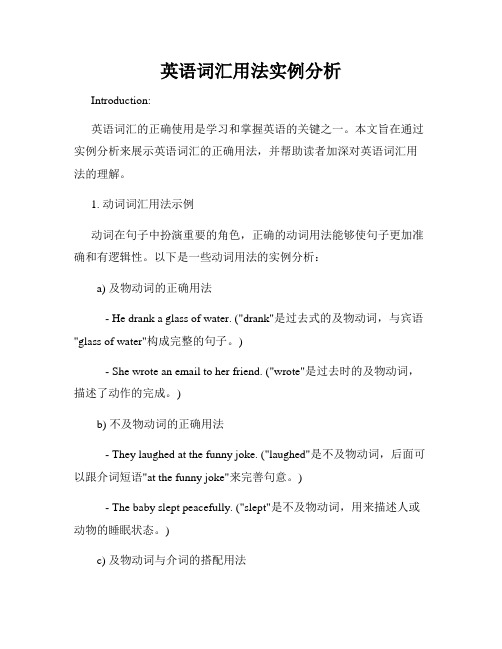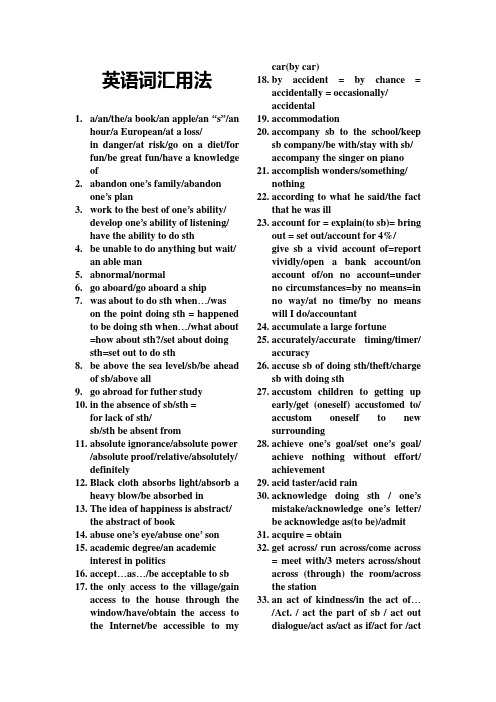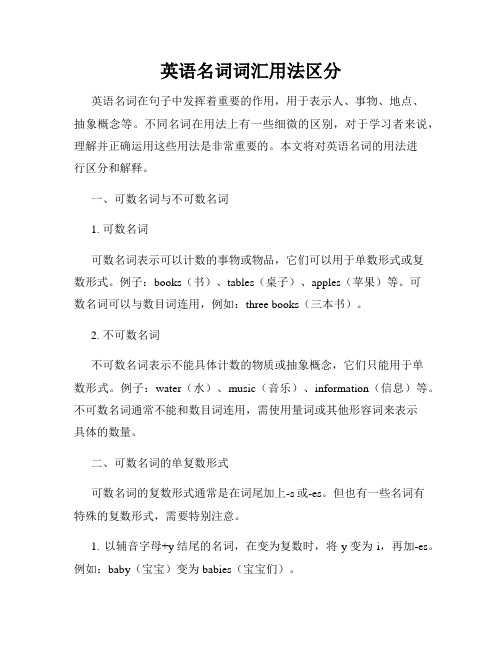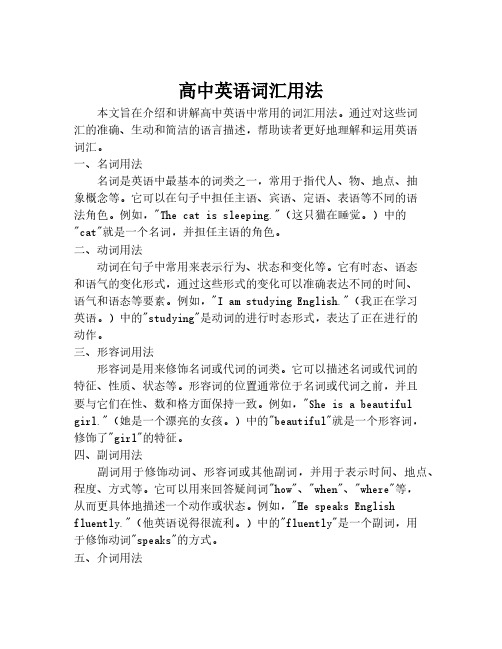英语词汇的用法
英语词汇用法实例分析

英语词汇用法实例分析Introduction:英语词汇的正确使用是学习和掌握英语的关键之一。
本文旨在通过实例分析来展示英语词汇的正确用法,并帮助读者加深对英语词汇用法的理解。
1. 动词词汇用法示例动词在句子中扮演重要的角色,正确的动词用法能够使句子更加准确和有逻辑性。
以下是一些动词用法的实例分析:a) 及物动词的正确用法- He drank a glass of water. ("drank"是过去式的及物动词,与宾语"glass of water"构成完整的句子。
)- She wrote an email to her friend. ("wrote"是过去时的及物动词,描述了动作的完成。
)b) 不及物动词的正确用法- They laughed at the funny joke. ("laughed"是不及物动词,后面可以跟介词短语"at the funny joke"来完善句意。
)- The baby slept peacefully. ("slept"是不及物动词,用来描述人或动物的睡眠状态。
)c) 及物动词与介词的搭配用法- She listened to music. ("listened to"是及物动词与介词的正确搭配,后面可以接名词或名词短语。
)- They looked for their lost keys. ("looked for"是及物动词与介词的正确搭配,表示寻找的动作。
)2. 名词词汇用法示例名词是英语中常见的词类,对名词的用法正确理解有助于句子的准确表达。
以下是一些名词用法的实例分析:a) 单数名词的用法- She bought a book yesterday. ("book"是单数名词,与冠词"a"配合使用表达一本书。
高考英语重点词汇语法用法总结大全

高考英语重点词汇语法用法总结大全1. ought to应当,应该2. keep up with跟上,赶上3. plenty of许多,大量的(作定语)4. in plenty许多,丰富(作状语)5. make a choice做出选6. now and then偶尔,时而7. prepare a dish做一道菜8. a balance diet均衡饮食9. be/go on diet在节食no longer不再10. be based on/upon以…为基础take medicine吃药11. be harmful to对…有害12. offer advise about/on提…的建议13. lose weight减肥14. cut …into pieces把…切碎15. gain weight=put on weight增肥16. make up for补偿17. get along with和…相处18. put up with忍受19. go for sb对某人也一样20. in large amount大批地21. be short of=be lacking of 缺乏,缺少22. do up one’s hair做发型23. refer to查阅,提到24. settle down定下心来,安家落户25. settle up付清,结账26. settle for勉强同意,接受27. settle in(使)习惯(环境等)28. settle on定居(短暂停留)of high/good quality高质量的29. sign an agreement with…与…达成协30. in relation to与…有关的31. but for要不是32. thanks to由于,幸亏33. apart from除…之外34. hand down传下来35. and so on等等36. in ancient time在古代37. go against违背38. guide to(介词)指导39. of (no) effect(无)效40. take effect生效,奏效41. bring/carry…into/to effect实施42. come/go into effect开始实施43. depend on/upon依靠44. That/It (all) depends.这很难说。
英语词汇用法

英语词汇用法1.a/an/the/a book/an apple/an “s”/anhour/a European/at a loss/in danger/at risk/go on a diet/for fun/be great fun/have a knowledge of2.abandon one’s family/abandonone’s plan3.work to the best of one’s ability/develop one’s ability of listening/have the ability to do sth4.be unable to do anything but wait/an able man5.abnormal/normal6.go aboard/go aboard a ship7.was about to do sth when…/wason the point doing sth = happened to be doing sth when…/what about =how about sth?/set about doingsth=set out to do sth8.be above the sea level/sb/be aheadof sb/above all9.go abroad for futher study10.in the absence of sb/sth =for lack of sth/sb/sth be absent from11.absolute ignorance/absolute power/absolute proof/relative/absolutely/definitely12.Black cloth absorbs light/absorb aheavy blow/be absorbed in13.The idea of happiness is abstract/the abstract of book14.abuse one’s eye/abuse one’ son15.academic degree/an academicinterest in politics16.accept…as…/be acceptable to sb17.the only access to the village/gainaccess to the house through the window/have/obtain the access to the Internet/be accessible to my car(by car) 18.by accident = by chance =accidentally = occasionally/accidental19.accommodation20.accompany sb to the school/keep sbcompany/be with/stay with sb/accompany the singer on piano 21.accomplish wonders/something/nothing22.according to what he said/the factthat he was ill23.account for = explain(to sb)= bringout = set out/account for 4%/give sb a vivid account of=report vividly/open a bank account/on account of/on no account=under no circumstances=by no means=in no way/at no time/by no means will I do/accountant24.accumulate a large fortune25.accurately/accurate timing/timer/accuracy26.accuse sb of doing sth/theft/chargesb with doing sth27.accustom children to getting upearly/get (oneself) accustomed to/ accustom oneself to new surrounding28.achieve one’s goal/set one’s goal/achieve nothing without effort/ achievement29.acid taster/acid rain30.acknowledge doing sth / one’smistake/acknowledge one’s letter/ be acknowledge as(to be)/admit31.acquire = obtain32.get across/ run across/come across= meet with/3 meters across/shout across (through) the room/across the station33.an act of kindness/in the act of…/Act. / act the part of sb / act out dialogue/act as/act as if/act for /act on(upon) /take strict action todo/suit action to words / actions speak louder than words/ take an active (passive) part in (sth/doing sth)/do a lot of activity =sport =exercise/actor/actress34.actual price / an actual event / inactual fact/actually =as a matter of fact=in fact =in effect =in reality / as a matter of course35.adapt myself …to …(doing sth)/adjust … to …/adopt sb/a plan 36.add…to…/add to the beauty/addup to 9/ in addition (to that) = besides(that)37.additives/explosives/relatives38.address the public / address theletter39.adequately=properly/good enough/take adequate action to do sth 40.administer a company / the law /help to refugees / administrate the departmet / administrator / administration41.admire sb for sincerity = admirehis sincerity/adore/respect42.pay for admission / admission tothis school is for boys / gain admission to this school / admit one’s error/admit doing /admit that…/ admit sb to be foolish/ be admitted to(into) FudanUniversity 43.The soldiers advanced to the town/stop one’advance/advance sb some money/As science advances/make some advances (advancement) / book the tickets in advance/ an advanced teacher44.take some advantage of=use=makeuse of sb to do sth/have the advantage of developing mentally and physically / discuss the advantages and disadvantages of shopping online / advantageous condition 45.a spirit of adventure/have a lot ofadventures/joint venture/experience46.advertise a new product on TV/advertise for a job47.give sb a piece of advice on/about/as to how to do sth/concerning/ regarding / as for / in(with) regard (respect/reference) to/advise sb to do sth/advise (that) sb should do/ persuade sb into doing sth/try to persuade sb to do sth/advisable 48.aeroplane / airplane /the aerospaceindustry49.current affairs/love affairs。
英语名词词汇用法区分

英语名词词汇用法区分英语名词在句子中发挥着重要的作用,用于表示人、事物、地点、抽象概念等。
不同名词在用法上有一些细微的区别,对于学习者来说,理解并正确运用这些用法是非常重要的。
本文将对英语名词的用法进行区分和解释。
一、可数名词与不可数名词1. 可数名词可数名词表示可以计数的事物或物品,它们可以用于单数形式或复数形式。
例子:books(书)、tables(桌子)、apples(苹果)等。
可数名词可以与数目词连用,例如:three books(三本书)。
2. 不可数名词不可数名词表示不能具体计数的物质或抽象概念,它们只能用于单数形式。
例子:water(水)、music(音乐)、information(信息)等。
不可数名词通常不能和数目词连用,需使用量词或其他形容词来表示具体的数量。
二、可数名词的单复数形式可数名词的复数形式通常是在词尾加上-s或-es。
但也有一些名词有特殊的复数形式,需要特别注意。
1. 以辅音字母+y结尾的名词,在变为复数时,将y变为i,再加-es。
例如:baby(宝宝)变为babies(宝宝们)。
2. 以s, x, ch, sh等音结尾的名词,直接加-es。
例如:bus(公共汽车)变为buses(公共汽车们)。
3. 以-o结尾的名词,通常加上-es。
例如:potato(土豆)变为potatoes(土豆们)。
4. 以辅音字母+o结尾的名词,在变为复数时,直接加-s。
例如:photo(照片)变为photos(照片们)。
5. 以f或fe结尾的名词,通常将f或fe变为v,再加上-es。
例如:leaf(叶子)变为leaves(叶子们)。
三、可数名词与不可数名词的区别1. 可数名词可以用于单数形式或复数形式,而不可数名词只能用于单数形式。
例如:- I have a book.(我有一本书。
)- I have books.(我有很多书。
)- I have information.(我有一些信息。
初高中英语A部分词汇用法

初高中英语A部分词汇用法英语核心词汇具有特定的内涵和一定的数量,其确定方法也并不复杂,但如何确定英语核心词汇在英汉学习词典里却需要综合考虑多方面的因素。
ability【用法详解】表示有能力做某事或具有做某事的能力等,其后通常要接不定式:She has the ability to speak French fluently.她能流利地说法语。
但在现代英语中,也可后接 of doing sth(不如接不定式普遍,建议初学者谨用):I admire his ability of doing the work quickly.我羡慕他工作做得快。
able【用法详解】1. 表示“有能力的”、“能干的”,可用作表语或定语:He is an able manager.他是位有能力的经理。
2. 用于 be able to do sth(能或会做做某事):I will not be able to come tomorrow.我明天来不了。
注意:be able to 不仅有多种时态形式(通常不用于进行时或与 be going to 连用),而且还可以与某些情态动词连用(通常不与 can 连用),甚至还可以有非谓语形式:Since his accident he hasn’t been able to leave the house.自出事之后,他一直未能离开家。
I regret not being able to help her.我很遗憾未能帮助她。
about【用法详解】1. 表示“大约”,通常用于数字前:It costs about $20.这需 20 美元左右。
2. 在动词 know, hear, speak 等之后用不用介词 about, 含义有差别:She knows him.她认识他。
She knows about him.她知道有关他的情况。
3. be about to (do),意为“即将”、“马上”。
高中英语词汇用法

高中英语词汇用法本文旨在介绍和讲解高中英语中常用的词汇用法。
通过对这些词汇的准确、生动和简洁的语言描述,帮助读者更好地理解和运用英语词汇。
一、名词用法名词是英语中最基本的词类之一,常用于指代人、物、地点、抽象概念等。
它可以在句子中担任主语、宾语、定语、表语等不同的语法角色。
例如,"The cat is sleeping."(这只猫在睡觉。
)中的"cat"就是一个名词,并担任主语的角色。
二、动词用法动词在句子中常用来表示行为、状态和变化等。
它有时态、语态和语气的变化形式,通过这些形式的变化可以准确表达不同的时间、语气和语态等要素。
例如,"I am studying English."(我正在学习英语。
)中的"studying"是动词的进行时态形式,表达了正在进行的动作。
三、形容词用法形容词是用来修饰名词或代词的词类。
它可以描述名词或代词的特征、性质、状态等。
形容词的位置通常位于名词或代词之前,并且要与它们在性、数和格方面保持一致。
例如,"She is a beautiful girl."(她是一个漂亮的女孩。
)中的"beautiful"就是一个形容词,修饰了"girl"的特征。
四、副词用法副词用于修饰动词、形容词或其他副词,并用于表示时间、地点、程度、方式等。
它可以用来回答疑问词"how"、"when"、"where"等,从而更具体地描述一个动作或状态。
例如,"He speaks English fluently."(他英语说得很流利。
)中的"fluently"是一个副词,用于修饰动词"speaks"的方式。
五、介词用法介词是用来表示两个词或短语之间关系的词类。
英语中各种词性的用法及解释

英语中百般词汇性的用法及阐明之阳早格格创做1.名词汇名词汇不妨分为博有名词汇(Proper Nouns)战一般名词汇 (Common Nouns),博有名词汇是某个(些)人,场合,机构等博有的称呼,如Beijing,China等.一般名词汇是一类人大概物品大概是一个抽象观念的名词汇,如:book,sadness等.一般名词汇又可分为底下四类:1)个体名词汇(Individual Nouns):表示某类人大概物品中的个体,如:gun.2)普遍名词汇(Collective Nouns):表示若搞个个体组成的集中体,如:family.3)物量名词汇(Material Nouns):表示无法分为个体的真物,如:air.4)抽象名词汇(Abstract Nouns):表示动做、状态、本量、感情等抽象观念,如:work.2. 形容词汇形容词汇建饰名词汇,证明真物大概人的本量大概特性.常常,可将形容词汇分成本量形容词汇战道述形容词汇二类,其位子纷歧定皆搁正在名词汇前里.1) 曲交证明真物的本量大概特性的形容词汇是本量形容词汇,它有级的变更,不妨用程度副词汇建饰,正在句中可做定语、表语战补语.比圆:hot 热的.2) 道述形容词汇只可做表语,所以又称为表语形容词汇.那类形容词汇不级的变更,也不可用程度副词汇建饰.大普遍以a启头的形容词汇皆属于那一类.比圆:afraid 害怕的.(错) He is an ill man.(对于) The man is ill.(错) She is an afraid girl.(对于) The girl is afraid.那类词汇另有:well,unwell,ill,faint,afraid,alike,alive,alone,asleep,awake 等.3)形容词汇做定语建饰名词汇时,要搁正在名词汇的前边.然而是如果形容词汇建饰以-thing为字尾的词汇语时,要搁正在那些词汇之后,比圆:something nice3.副词汇及其基础用法副词汇主要用去建饰动词汇,形容词汇,副词汇大概其余结构.一、副词汇的位子:1)正在动词汇之前.2)正在be动词汇、帮动词汇之后.3)多个帮动词汇时,副词汇普遍搁正在第一个帮动词汇后. 注意:a. 大普遍办法副词汇位于句尾,然而宾语过少,副词汇不妨提前,以使句子仄稳.We could see very clearly a strange light ahead of us.b. 办法副词汇well,badly糟、坏,hard等只搁正在句尾. He speaks English well.二、副词汇的排列程序:1)时间,天面副词汇,小单位的正在前,大单位正在后. 2)办法副词汇,短的正在前,少的正在后,并用and大概but等连词汇连交.Please write slowly and carefully.3)多个分歧副词汇排列:程度+天面+办法+时间副词汇. 注意:副词汇very 不妨建饰形容词汇,然而不克不迭建饰动词汇.改错:(错) I very like English.(对于) I like English very much.注意:副词汇enough要搁正在形容词汇的后里,形容词汇enough搁正在名词汇前后皆可.I don't know him well enough.There is enough food for everyone to eat.There is food enough for everyone to eat.……形容词汇/定冠词汇/大概冠词汇皆是用去建饰名词汇的adj可建饰的是可数名词汇复数大概者是单数定冠词汇可建饰不可数战可数名词汇大概冠词汇a/an建饰可数名词汇单数副词汇(adv)建饰动词汇大概者是动词汇短语be动词汇后跟形容词汇大概者是当前分词汇介词汇(prep)后里跟动名词汇普遍用于句尾罕睹的有be动词汇,特殊疑问词汇(how what where ……)等,另如祈使句,常常是Don’t…情态动词汇(aux)后跟动词汇本形通联动词汇(Lv.)后跟形容词汇本级。
小学全年级英语词汇150个及用法(完整版)

小学全年级英语词汇150个及用法(完整版)1. Hello [həˈləʊ] 你好用于打招呼,例如:Hello, everyone! (大家好!)2. Hi [haɪ] 嗨;你好也是打招呼的常用语,如:Hi, Tom! (嗨,汤姆!)3. Goodbye [ˌɡʊdˈbaɪ] 再见分别时说,例如:Goodbye, my friend. (再见,我的朋友。
)4. Bye [baɪ] 再见简单的告别语,如:Bye! Have a nice day. (再见!祝你有美好的一天。
)5. Morning [ˈmɔːnɪŋ] 早上;上午例如:Good morning! (早上好!)6. Afternoon [ˌɑːftəˈnuːn] 下午如:Good afternoon! (下午好!)7. Evening [ˈiːvnɪŋ] 晚上例如:Good evening! (晚上好!)8. Night [naɪt] 夜晚如:Good night! (晚安!)9. Name [neɪm] 名字例如:What's your name? (你叫什么名字?)10. I [aɪ] 我如:I am happy. (我很开心。
)11. You [juː] 你;你们例如:You are nice. (你真好。
)12. He [hiː] 他如:He is my brother. (他是我哥哥。
)13. She [ʃiː] 她例如:She is my sister. (她是我妹妹。
)14. Boy [bɔɪ] 男孩如:The boy is cute. (这个男孩很可爱。
)15. Girl [ɡɜːl] 女孩例如:The girl is beautiful. (这个女孩很漂亮。
)16. Dad [dæd] 爸爸如:Dad, I love you. (爸爸,我爱你。
)17. Mum [mʌm] 妈妈例如:Mum, can I have a candy? (妈妈,我能吃颗糖吗?)18. One [wʌn] 一如:One apple. (一个苹果。
- 1、下载文档前请自行甄别文档内容的完整性,平台不提供额外的编辑、内容补充、找答案等附加服务。
- 2、"仅部分预览"的文档,不可在线预览部分如存在完整性等问题,可反馈申请退款(可完整预览的文档不适用该条件!)。
- 3、如文档侵犯您的权益,请联系客服反馈,我们会尽快为您处理(人工客服工作时间:9:00-18:30)。
英语数词基数词的表示法1.以下是最基本的基数词,学习者必须牢记:one(1), two(2), three(3),four(4), five(5), six(6), seven(7), eight(8), nine(9), ten(10), eleven(11), twelve(12), thirteen(13), fourteen(14), fifteen(15), sixteen(16), seventeen(17), eighteen(18), nineteen(19),twenty(20), thirty(30), forty(40), fifty(50), sixty(60),seventy(70), eighty(80), ninety(90), a hundred(100), athousand(1000), a million(1000000), a billion (十亿)2. 21—99 的表示法。
先说“几十”,再说“几”,中间加连字号:twenty-one(21), thirty-six(36), forty-five(45), ninety-nine(99)等。
3.101—999的表示法。
先说“几百”,后接and,再加末尾两位数(或末位数):one hundred and one(101), five hundred and thirty(530),seventy hundred and eighty-nine(789)4.1000 以上的基数词的表示法。
先从右至左数,每三位数加一个逗号(即以此把数目分为若干段)。
第一个逗号前的数为thousand(千),第二个逗号前的数million(百万),第三个逗号前的数为billion(十亿),第四个逗号前的数为 trillion(万亿),然后一段一段地数:9, 883 nine thousand, eight hundred and eighty-three65, 359 sixty-five thousand, three hundred and fifty-nine265, 468 two hundred and sixty-five thousand, four hundred andsixty-eight60, 263, 150 sixty million, two hundred and sixty-three thousand, one hundred and fifty【说明】① 英语没有“万”这个单位,要表示“万”须借用thousand,如“一万”用“十千”表示(ten thousand),“十万”用“百千”表示(one hundred thousand)。
② hundred, thousand, million, billion 等词在读数时不带复数词尾-s(即用单数形式)。
③ 在hundred 后通常加上连词,不过此and 在美国英语中可以省略。
若读数中没有 hundred,则在thousand后加and。
④一个数的最高位若为“一”,这个“一”可用a或one表示,但在数字中间的“一”,则只能用one,不能用a:1600 a [one] thousand and six hundred6100 six thousand and one hundred (其中的 one 不可改为a)⑤ 在非正式场合,人们也常以hundred 为单位来读数,对于1100至1900之间的整数尤其如此(参见年代的读法):It cost fifteen hundred pounds. 这东西花了1500英镑。
序数词的表示法1.以下是最基本的序数词,学习者必须牢记:first(第1), second(第2), third(第3), fourth (第4), fifth(第5), sixth(第6), seventh(第7), eighth(第8), ninth(第9), tenth(第10), eleventh(第11), twelfth(第12), thirteenth(第13), fourteenth(第14), fifteenth(第15), sixteenth(第16), seventeenth(第17), eighteenth(第18), nineteenth(第19), twentieth(第20), thirtieth(第30), fortieth(第40), fiftieth(第50), sixtieth(第60), seventieth(第70), eightieth(第80), ninetieth(第90)。
【说明】① 许多序数词是由相应的基数词后加th构成的,如:four / fourth,six / sixth,ten / tenth,sixteen / sixteenth,但是nine 变为序数词是ninth,而不是nineth。
② twentieth, thirtieth, fortieth 等表示整十的序数词,由相应的基数词将词尾y改为ie,再加th 构成。
③ first, second, third 通常可缩写为1st, 2nd, 3rd。
凡是以th结尾的序数词可缩写为“基数词+th”:4th, 5th, 9th, 11th, 60th, 128th 等。
2.非整十的多位数,将个位数变成序数词即可:twenty-first(第21),thirty-sixth(第36),ninety-ninth(第99),three hundred andsixty-fifth(第365)等。
3. hundred, thousand, million 等序数词形式为 hundredth, thousandth, millionth 等:five hundredth (500th) 第500 ten thousandth (10, 000th) 第10000)注意:这类词前用数字“一”时,这个“一”只用one,不用a:one hundredth 第100(不说a hundredth)既可序数词也可用基数词的场合1.日期的表示法通常用序数词,也可用基数词,如“5月5日”在书面语中通常写成5 May(英)或May 5th(美),而在口语中则通常说成 the fifth of May,May the fifth(英), May fifth(美)等。
2.在类似编号的场合,用序数词应放在被修饰词语之前,若用基数词则置于其后:the First Lesson / lesson one 第一课 the tenth chapter / chapter ten 第10章the sixth line / line 6 第6 行 the third part / part three 第三部分但是,在许多情况下,用基数词比用序数词更合适、更方便:Book One 第一册 Room 805 805房page 110 第110页 Bus Number Ten 第10路公共汽车序数词前使用冠词应注意的两点1.序数词前通常要用定冠词It’s the third time I’ve been here. 这是我第三次来这儿。
The second is better than the first. 第二个比第一个好。
【说明】① 表示考试或比赛等的名次时,通常省略定冠词:She was (the) third in the exam. 她考试得了第三名。
②序数词用作副词时也通常不用冠词:He came first. 他先来。
I’ll have to finish my homework first. 我得先把作业做完。
③有些习语中的序数词前没有冠词:at first 开始 at first sight 乍看起来 first of all 首先④ 但若序数词前用了物主代词或名词所有格,则不能再用定冠词:his second wife 他的第二个妻子Tom’s third book 汤姆的第三本书2.序数词前有时可用不定冠词,表示次第在原有基础上的增加:A second student stood up. 又一个(第二个)学生站了起来。
I want to read the book a third time. 这本书我想读第三次。
序数词前用定冠词和不定冠词的区别在于,定冠词表特指,不定冠词表泛指,有类似another的意思,但比another 的意思更明确:I like the third girl. 我喜欢第三个女孩。
(至少有三个女孩供选择,特指)I saw a third girl. 我又看见了第三个女孩。
(暗示原来已看见两个,这已是第三个)数词的主要用法一、表示日期1949年1949读作nineteen forty-nine6月23日June 23rd读作June(the) twenty-third或the twenty-third of June2006年10月October 2006 读作October, two thousand and six1600年5月2日May 2nd, 2005读作the second of May, sixteen hundred二、表示钟点半小时用half,一刻钟用a quarter,半小时以内用past,超过半小时用to。
08:00 eight o’clock或eight09:15 nine fifteen或a quarter past/after nine02:30 two thirty或half past/after two05:45 five forty-five或a quarter to six14:15 fourteen fifteen=2.15 p. m.23:05 twenty-three oh five24:00 twenty-four hundred hours=midnight三、表示编号1. 单纯的编号,可在基数词前加number,简写为No.。
如No.2第二。
2. 序号与事物名词连用时分三种情况:(A)小序号可用“the +序数词+名词”或“名词+基数词”。
如第一次课可以说the First Lesson或Lesson One。
(B)大序号通常只用“名词+数词”。
如808号房间Room 808;168路公共汽车Bus No.168;南京路1490号1490 Nanjing Road;电话号码83545601(用基数词逐个念,0念字母O)。
I用“a/the + number+基数词+名词”。
如a No.3 bus一辆三路公共汽车,the No.3 bus那辆三路公共汽车。
